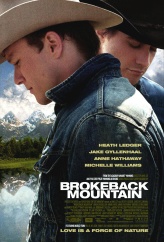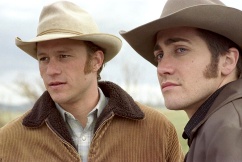| Brokeback Mountain |
| |
 |
USA, 2005. Rated R. 134 minutes.
Cast:
Heath Ledger, Jake Gyllenhaal, Michelle Williams, Anne Hathaway, Randy Quaid, Linda Cardellini, Anna Faris, Scott Michael Campbell, Kate Mara, Cheyenne Hill, Brooklynn Proulx, Graham Beckel, Fayette Newsome
Writers: Larry McMurtry & Diana Ossana, based on the short story by Annie Proulx
Original Music: Gustavo Santaolalla
Cinematography: Rodrigo Prieto
Producers: Diana Ossana, James Schamus
Director: Ang Lee
LINKS
|
 here's a huge Oscar buzz surrounding Brokeback Mountain, and not just because it depicts a homosexual Marlboro Man love story, which therefore makes it a controversial and daring film. Brokeback Mountain is a wonderful love story, period—a tragic tale of two people who forge a connection and must thereafter deny it to themselves. The first forty-five minutes are wonderful, anyway.
here's a huge Oscar buzz surrounding Brokeback Mountain, and not just because it depicts a homosexual Marlboro Man love story, which therefore makes it a controversial and daring film. Brokeback Mountain is a wonderful love story, period—a tragic tale of two people who forge a connection and must thereafter deny it to themselves. The first forty-five minutes are wonderful, anyway.
It's Signal, Wyoming, 1963. The opening shot of Brokeback Mountain identifies it as an Ang Lee film. The titular mountain looms over a plateau in the cool, misty blue light of dawn. The silence is gently broken by the rising sound of vehicles approaching. Time moves slowly here, in this seemingly enchanted place. Yet the mountain also gives it an air of solidity, of unchangeableness. In just this one shot, Lee establishes Brokeback Mountain as a metaphor and a motif, and introduces some of the themes of the film. Not that you're thinking about any of that as you first absorb the panorama. Brokeback Mountain is an introspective film, but not, thankfully, an inert film like Lee's Ride with the Devil.
Ennis Del Mar (Heath Ledger) and Jack Twist (Jake Gyllenhaal) have come to Brokeback to seek employment as cowboys—or more accurately, sheepherders—with rancher Joe Aguirre (Randy Quaid). Neither man speaks much, especially Ennis, but they're stuck up on the mountain together for the entire summer. They have time to get to know each other, and Lee wisely gives them that time, developing their relationship almost imperceptibly. Bit by bit, Jack reveals his clowning, more extroverted nature, and Ennis begins stringing together complete sentences. When Ennis is first naked onscreen, washing himself, he does not attract Jack's attention (or maybe Jack refuses to look). This relationship will certainly be physical, but it isn't starting that way.

Jake Gyllenhaal (left) and Heath Ledger star in Brokeback Mountain. |
When it does get physical, though, the film does not shy away. The sex scene is rough and about as explicit as it can be without actually showing any people parts. The price of their liaison is a disemboweled sheep, killed by a wolf while the herd is left unattended—a powerful visual symbol of the danger of their illicit desire. Ennis is deeply troubled and confused, and hastens to clarify that he “ain't queer.” Jack, the instigator, “ain't either,” though it's clearly not his first time.
The affair continues, but at the end of summer the two young men part ways. This is when Brokeback Mountain begins to lose its sense of detail as it accelerates. The men do what inflexible society (unchangeable like the mountain) expects of them by establishing heterosexual relationships and families. Ennis marries his pre-existing girlfriend Alma (Michelle Williams). Jack somehow winds up with rodeo queen Lureen (Anne Hathaway) instead, slow dancing to the words “no one's going to love you like me” (elegantly sung by up-and-coming alt-country singer Mary McBride).
It's all very conventional, but it's also completely unsatisfying. After four years, Ennis and Jack reconnect and their torrid affair starts up again. They're not very smart, though. They're found out by Alma within thirty seconds of Jack's arrival because Ennis is dumb enough to kiss him right in front of the house. Alma reacts as if gut-punched, but she doesn't say anything. Ennis' stupidity may seem incredible, but it's a wise story choice. Brokeback Mountain isn't about the possibility that Ennis and Jack might be found out; it's about the reality in which they must live.
The film moves faster. It's got twenty years to cover. Ennis and Jack establish regular “fishing trips” to Brokeback Mountain, which Alma tolerates while Lureen remains clueless and undeveloped as a character. The story logic grows sketchy. Ennis prefers to have sex with Alma from behind, which I guess is supposed to be significant. Later there's a scene of Alma insisting Ennis use protection, which he uses as an excuse to roll over and go to sleep. Cut to them getting divorced. Afterward, Ennis shuts his daughter out of his life, despite his love for her and her desperation to have a connection with him. Story threads are introduced and go nowhere, like Jack's tension with his in-laws, who have little use for him. Meanwhile, the four principal actors seem increasingly ridiculous as older characters, particularly Hathaway, who just looks like a kid in a wig. Come to think of it, the Princess Diaries star is just a kid in a wig, topless scene or no.
Sublimated desire and living against one's nature manifest as anger for Ennis and risk-taking for Jack, for whom the occasional fishing trip is not sufficient to satisfy his urges. Makes sense. Beyond that however, the more you probe, the more you notice how maddeningly vague the story is. Why do Ennis and Jack get conventionally married and plan to live unhappily ever after? Because that's what men are expected to do in the Sixties, especially in rural America. Fine. But what about these two specific men? Rather than answer the question, Brokeback Mountain depends on audience sympathy for their general situation—two men trapped by society, repressing their desires, doomed never to express their true love, blah blah blah—to achieve emotional resonance.
Imprecision and underdeveloped logic is reminiscent of another film adapted from an Annie Proulx story, The Shipping News—a haphazard, emotionally soggy piece of work. The best comparison, though, is to The Hours—the Julianne Moore segment in particular. She plays an unhappy, unfulfilled Fifties housewife who is unhappy and unfulfilled basically because housewives in the Fifties were unhappy and unfulfilled—a fuzzy, circular, generalized argument not grounded in character. You're just supposed to accept it because you know That's How Things Were. Similarly, Brokeback Mountain relies on your knowing That's How Things Were (and still are in many places) to fill in the details.
Brokeback Mountain is much better than either The Shipping News or The Hours, though. Partly that's because the minimalist style and cinematographer Rodrigo Prieto's evocative imagery disguise how little the writing actually conveys in the second half. Partly because Ledger and Gyllenhaal deliver stirring performances as Ennis and Jack, the former painfully stoic and the latter more emotionally exposed. Mostly it's because the powerful, painstakingly crafted first part gives the film a large enough reserve of emotional energy to sustain momentum. Then, the haunting finale restores a sense of beauty and grace. Yes, it's a gay cowboy movie. As such, it carries great burdens, both of those who would view it as a colossal evil and of those who would view it as a colossal breakthrough. In the end, though, it sets aside those burdens by being simply a heartbreaking film about love denied by the smothering pressure of societal norms.
[Read the AboutFilm interview with Jake Gyllenhaal]
[Read the AboutFilm interview with Ang Lee]
Review
© December 2005 by AboutFilm.Com and the author.
Images © 2005 Focus Features. All Rights Reserved.


